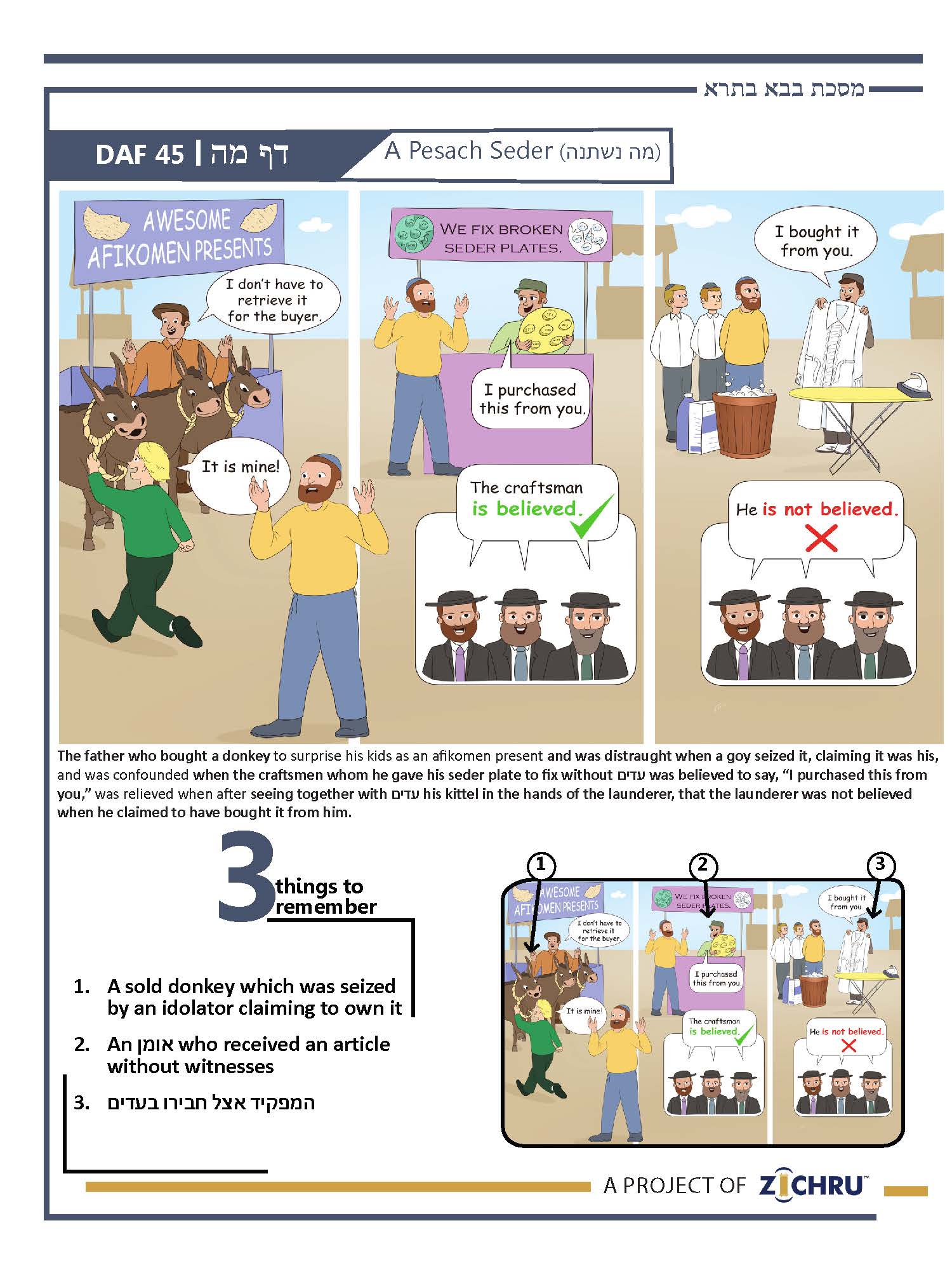- Audio Timestamps
0:00 - The 3 Sugyos
2:42 - Review of 3 Sugyos
5:13- Siman
7:52 - 4 Blatt Back Chazarah
16:26 - Pop Quiz (Last 7 blatt)
For access to all Zichru resources including PDFs, and illustrations CLICK HERE
- A sold donkey which was seized by an idolator claiming to own it
Rav (or Rav Pappa) announced: If one sold a donkey to his fellow Jew, and an idolator seized it, claiming it belongs to him, דינא הוא דמפצי ליה מיניה – the law is that [the seller] must retrieve it from him. Since there is circumstantial evidence for this claim, as below, the seller must bring witnesses to prove he owned it, in the hope that the idolator will heed the court’s ruling to return it. This only applies where the idolator seized only the donkey, but not its saddle. This indicates he is only taking what is actually his, which supports his claim. Ameimar says that the seller is never required to retrieve the donkey: מידע ידע דסתם עובד כוכבים אנס הוא – [the buyer] surely knows that an ordinary idolator seizes what is not his, and cannot be trusted, as the passuk says: אשר פיהם דבר שוא וימינם ימין שקר – “whose mouths speak vanity, and whose right hand is the right hand of falsehood.”
- An אומן who received an article without witnesses
The Mishnah on Daf 42a taught that an אומן – craftsman does not establish a chazakah to own something by merely possessing it. Rabbah says this only applies where witnesses saw the אומן receive the item, אבל מסר לו שלא בעדים – but if he gave it to him without witnesses present: מתוך שיכול לומר לו לא היו דברים מעולם – since he could have told [the first owner], “It never happened that you gave the item to me” (even if the item was seen in his possession, because he could have claimed he purchased it from someone else), כי אמר ליה נמי לקוחה היא בידי מהימן – therefore, even when he says, “I have it as a purchased item from you,” he is also believed. Abaye asked that if so, even if witnesses saw the אומן receive it to repair, but it is unknown if he still has it, we should say: מתוך שיכול לומר לו החזרתיו לך – since he could say, “I returned it to you,” he should be believed to say he purchased it after receiving it to repair!? Abaye holds the critical factor is if the item was seen in his possession; if it was, he cannot claim he bought it, since he likely received it for repairs. On Daf 46a, Rabbah’s opinion is refuted.
- המפקיד אצל חבירו בעדים
Rabbah answered Abaye’s challenge by disagreeing that the אומן would be believed that he returned an item given to him in front of witnesses: אלא המפקיד אצל חבירו בעדים – Rather, one who deposits an item with his fellow before witnesses, צריך להחזיר לו בעדים – he must return it to him before witnesses, because the owner’s precaution is tantamount to stipulating that the recipient needs to prove he returned it. Abaye challenged Rabbah from a Baraisa: ראה עבדו ביד אומן – If one saw (i.e., with עדים) his slave in the possession of a craftsman (who would teach him his trade), וטליתו ביד כובס – or his cloak in a launderer’s possession, and the craftsman claims to have bought it, he is not believed. If witnesses saw the item originally given to the אומן, then why does the Baraisa require that it was also seen in the אומן’s possession? According to Rabbah, even without proving it is in his possession, he is not believed he bought it, since he cannot claim to have returned it!? Rabbah conceded: הדרי בי – I retract my earlier ruling, and one is believed to have returned an item given to him with עדים.
Siman – A Pesach Seder (מה נשתנה)
The father who bought a donkey to surprise his kids as an afikomen present and was distraught when a goy seized it, claiming it was his, and was confounded when the craftsmen whom he gave his seder plate to fix without עדים was believed to say, “I purchased this from you,” was relieved when after seeing together with עדים his kittel in the hands of the launderer, that the launderer was not believed when he claimed to have bought it from him.







